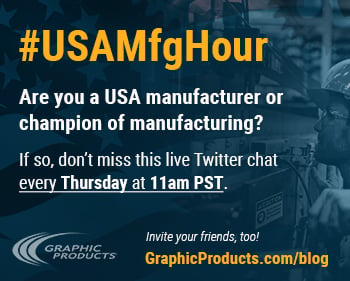SEO for Manufacturers
03
February,
2023
7 MINUTE READ

Search engine optimization ? you might have heard of it. But do you use it effectively? Using SEO effectively can help manufacturers make their presence known throughout the internet. Social media marketing expert Ruby Rusine of Social Success Marketing and marketing manager Rebecca Hart of manufacturer Drive Source International/Dynamatic led a chat on SEO for the #USAMfgHour chat on Twitter.
Get Noticed Online
According to SEO analysis website Ahrefs, there are ways to crack into higher search engine rankings, which will give any business more visibility online. Ahrefs reports that:
- 68% of online experiences begin with a search engine
- 7% of search queries contain four words or more
- SEO leads have a 14.6% close rate
What exactly is SEO?
"SEO is for optimizing your website or web-based asset to be easily found by search engines. Consider what string of words your customer or user would type into a search engine to find a company like yours. SEO helps to make sure you are found in those searches," said Paul Kiesche of Aviate Creative in New Jersey.
"1. Understanding the language of the customer. 2. Identifying the terms that they use for your products or services. 3 Sprinkling these terms throughout your web page focusing on one term per page," said Nigel T. Packer of PelaTis Online in the U.K. "There is more but not enough space in Twitter."
"It's the process of improving the search engine rankings for a website," said JD Allen of Cleveland Deburring Machine Company in Cleveland, Ohio.
"I call it "getting the most bang for no buck." All content, keywords, and activities that get you crawled and ranked/indexed by Google so you can be found at the top of the list in a search," said Gina Tabasso, a manufacturing marketing professional from MAGNET, an Ohio manufacturing extension program.
"It is what the librarian uses to decide which book will absolutely meet the reader's needs," said Earthling Interactive in Madison, Wisconsin.
"Using words to get seen on search engines essentially. Could be on a website or blog or anything else on the web, really," said Ben Nordman of Obsidian Manufacturing in Rockford, Illinois.
"A tool for helping your customers locate your business based on metadata input," said Matt from Americorp Financial in Birmingham, Michigan.
"SEO is the process of maximizing the website visitors by making sure the site appears on search engines in optimum positions," said North American Coating Laboratories in Mentor, Ohio.
"Search engine optimization is a fancy phrase for a simple concept-delivering the most relevant information to the search engines, which then display your company's web information on your customers' and leads' browsers," said Rusine. "It is a catch-all phrase for a variety of on-page and off-page factors that will improve a website's ranking in a search engine's results pages (SERPs). These include improving website content quality, engagement-related metrics such as bounce rate and time spent on a page, and links to the site."
To break it down, SEO includes:
- On-page factors include site structure (navigation, page-load time, etc.), site content (quality, relevance, etc.)
- Off-page factors include blog outreach, social media signals, building backlinks
Why should your company care about SEO?
"SEO helps turn your website into a better, more actionable tool. It doesn't solve every sales problem, but it helps the right people find the right places on your website. It's a way to distribute relevant information to the audience seeking that information," said Mike Womack of NJMEP in New Jersey.
"Don't leave anything on your website's findability to chance," said Rusine.
"It's incredibly important to be found by new customers or just maintaining brand awareness. When done right, it can create leads and get your business sales," said Obsidian.
"Yes, yes, and yes! People don't often connect SEO with lead generation," affirmed DSI/Dynamatic.
"If your company wants to be found when your buyer searches online for your type of business, then you should care. If it's not found, you don't exist to them. If it is found, well, you have a better shot of landing that business," said Kiesche.
"It's amazing how many people put no emphasis on SEO. But I think it's because it's misunderstood," said DSI/Dynamatic.
"SEO is not for the short game, like social media. If you play, you gotta be in it for the long game. If you want quick results, then pay for ads," said Rusine.
"1. Know who your competitors are. 2. Who your current and potential customers are. 3. Because it's fun! 4. Trackable marketing activity with KPIs that are constantly changing," said NACL.
"To be available to your customers! On the information highways, SEO is the off-ramp to your business' front door (digitally speaking)," said Americorp.
"It's inexpensive, and you want to be found and drive traffic to your website," said Tabasso.
"Why your company should NOT care about SEO: 1. You have a very discreet audience that you do not need or want to grow," said Earthling Interactive.
"SEO helps your company's products or service bubble up to the top of search engine results, & that takes the advantage away from the competition," said Rusine. "It helps your company get to the heart of your customers' habits and needs helping you gain trustworthiness and authority. Helps you to be able to offer content relevant to what a user has searched for into your website so you can market your brand or products more effectively."
Do you have SEO in place?
"Absolutely! We're working on it every day. Whether it's optimizing pages or old blogs, checking for missing metadata, or creating new content that our audience needs, it's a constant effort," said NJMEP.
"Yes, it's one of the many things we do for our marketing. SEO does not play a big role in our lead generation, but it does help," said Kiesche.
"Ooooh, that's a hard one. Can we put it on a scale of 0-5? with five being you are 100% winning? I'd give us a 2.5 (yikes!)," said Earthling Interactive.
"Yes, we do! We occasionally get behind on it having a smaller marketing team and a lot of products/services, but we get it done," said Obsidian.
"Yep, but it's a continual process," said Cleveland Deburring.
"It sure is! We review ours often, as should any good marketing department," said DSI/Dynamatic.
"We do! I (Kelley) coordinate our SEO efforts! It's a huge part of our digital strategy," said NACL.
"Our agency is working on it, and the company is actively looking for a new marketing manager," said Tabasso.
"You may not be an expert, but I suggest that you should have some form of SEO in place," said Rusine.
What has been your biggest challenge in SEO?
"Sometimes a challenge can be keeping up with keywords. Since keywords are based on human behaviors, they change often. It's a good idea to review your SEO often," said DSI/Dynamatic.
"Time. We have a smaller internal marketing team. We all wear many hats! It can be challenging to make time to review, rework, and keep up with the latest trends however, it's absolutely necessary and critical to our organizations' success so it must be done," said NJMEP.
"Honestly, sometimes is simply keeping up with all of the changes that happen in search and the different strategies for different platforms (ex: Google vs Duck Duck Go). Luckily there are some good tools," said NACL.
"Like I sort of mentioned in the last answer, keeping up with updating it! We have a small marketing team, but we have four brands, three product lines, and a grinding shop. There can definitely be times where it is a little overwhelming," said Obsidian.
"Small staff can be a challenge no matter WHAT the task! many manufacturing companies don't have large marketing departments. Often, it's just 1-2 people," said DSI/Dynamatic.
"For a long time, there was too much competition for the keywords. However, ever since we niched down in our positioning and marketing, it's been more effective," said Kiesche.
"Creating high-quality links," said Cleveland Deburring.
"Buy-in from leadership and their desire for bottom-line impact and lead gen," said Tabasso.
"That's a huge one and a constant battle," said Cleveland Deburring.
"Finding the customer-centric language to describe our services. We are really technical, but our ideal customers don't use the terminology that we use," said Earthling Interactive.
"If you're doing SEO, understand that you are going to play the long game that'll require consistency and patience," said Rusine.
Getting Results
How does SEO impact sales? Why should you bother?
"Practically 100% of the buying process for anything starts online. If you want to be part of a sales discussion with a customer, you must be seen/found online. Over 60% of people won't click on PPC ads and prefer organic listings," said Cleveland Deburring.
"It's a source of client acquisition! Often, a potential customer will look you up before engaging! The best part, you can track it," said NACL.
"In addition to helping you ?get found,' SEO practices support good customer experience. Appropriate headings, useful descriptions, fast loading time, keyword-centric URLs, and well-organized content all improve the user journey which should end with a sale," said Earthling Interactive.
"Sales leads!!!! The more traffic a company can get to their site and the more eyes they can get on their products, the more potential for leads and hopefully sales," said Obsidian.
"If you drive traffic to a compelling website with great content you can get people in the funnel," said Tabasso.
"SEO is about getting found on search engines. So if your leads can't find you as they search, then they can't buy from you. Buyers begin with a search - so seize the opportunity that they meet your company early in their buying journey," said Rusine.
What are your top 3 SEO tips?
"Never stop learning! I just read this article recently that debunks some common "Duplicate Content" myths. The education never stops, the effort never stops, always continue to improve," said NJMEP.
"I'm here to learn!! I know the importance and concepts behind why it's important but I'm still fairly new to practicing it," said Obsidian.
"Using a tool like Google Keywords, or Moz, or Alexa (not the AI), you can stay up to date on your most important keywords at any time. Some tools are free, but you get what you pay for," said DSI/Dynamatic.
"Content, content, content - fresh content; keywords; time," said Tabasso.
"1. List 10 key phrases that you want to be found for and be very specific. 2. Niche down. 3. Write about each one of your services or products and use keywords throughout. 4. Name your images with hyphens so the words are all searchable," said Kiesche. "5. Contribute to other sites and publishers so they backlink to your site. 6. Blog monthly 7. Add keywords to titles, headlines, sub-heads, etc. 8. Don't try to cheat, it makes it worse. 9. Keep the writing good quality and don't overload."
"Find resources of SEO experts and read their articles. Stay informed about the latest developments in SEO and all things search marketing because it's always evolving," said Cleveland Deburring.
"Speed baby! Content is a distinct challenge for every business but improving site speed can be straightforward (up to a point). Try this: https://developers.google.com/speed/pagespeed/insights/," said Earthling Interactive.

"1. Know all your keywords. Do research. Keep a list of it. Note that this is a moving target because people search for stuff differently," said Rusine. "Publish content based on your list of keywords. It reflects what people need, their problems, or what's popular. Optimization is text-based. Remember your keywords."
Use Google so use your keywords on:
- Web pages ? blog/landing pages
- Images
- Your videos
- PDF's
"Also check out Gina Tabasso's article on B2B SEO tips," said Rusine. "For your blog or landing pages, make sure these areas are optimized:
- Blog Content
- Title
- Headings
- Images
- Internal and external links
"For those who publish internal content regularly," Rusine suggests tools like:
A few go-to resources and references for SEO Rusine recommends are:
- Google's SEO starter guide
- Moz SEO for beginners
- Ahrefs SEO information
About #USAMfgHour
Anyone who champions U.S. manufacturing can join in on a new conversation each week on Twitter using the hashtag #USAMfgHour. The chat starts at 11 a.m. Pacific Standard Time/2 p.m. Eastern. Share positive blog posts, helpful articles, news, important information, accomplishments, events, and more with other manufacturers and supporters from throughout the country.
Are you interested in hosting a #USAMfgHour chat? Contact organizers @DCSCinc, @DanBiggerUSAMfg, and @SocialSMktg.
RELATED RESOURCES

Emotional Relevance Benefits Manufacturing
Emotional relevance can have a profound effect on manufacturing by strengthening relationships with ...
Read
Facing Hard Truths by Embracing Soft Skills
Qualifications and technical skills are essential for workers to have in today's market. How about those soft ...
Read
Leveraging Videos in Manufacturing
Videos attract and keep an audience. It is also a tool that the manufacturing industry is not using ...
Read.png)


